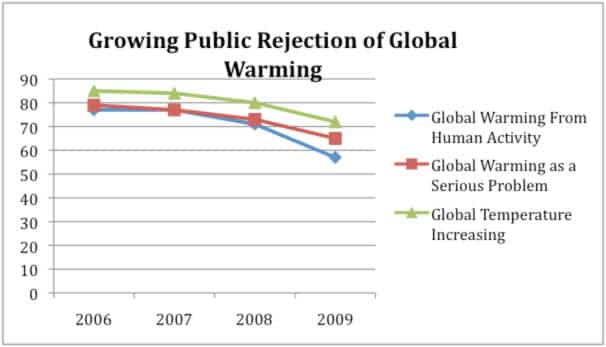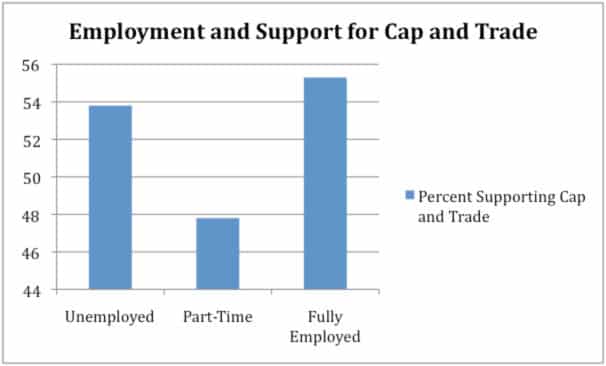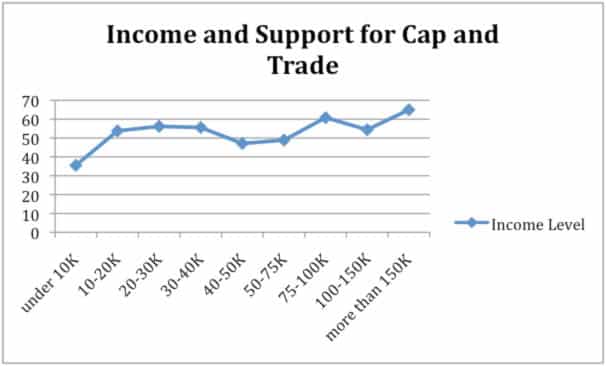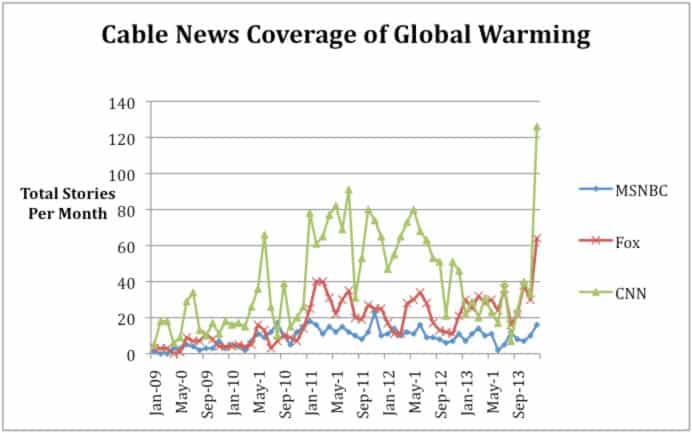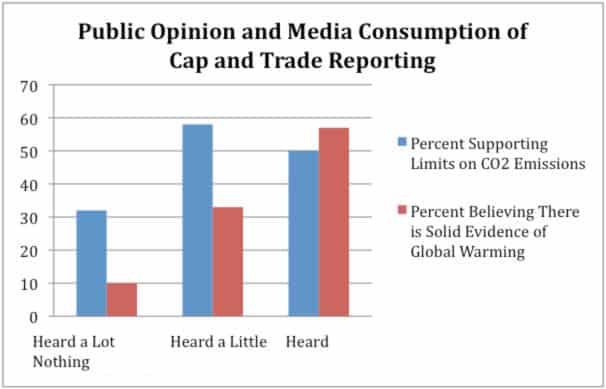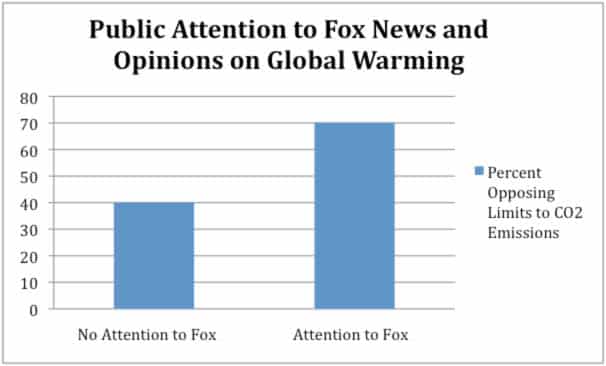On March 2, the New York Times ran a story informing readers of recent “controversies” related to global warming. The story chronicled the efforts of scientists affiliated with the United Nations Climate Panel and other major research institutions to answer the claims of conservatives who suggest there is a conspiracy to hide the “debate” over climate change. The Times’ story attempted to “objectively” report the controversy, highlighting on one side the efforts of climate scientists to “assert the legitimacy of the vast body of climate science” which states that global warming is real, and climate deniers on the other side seeking to expose scientists who “propagandize for shoddy science.”1
Global warming graduated in the last few years to the status of one of the great enduring political issues of our time. Unfortunately, public discourse is taking a dramatic step backward in light of corporate media’s attacks on the scientific community. Scientific studies are greatly furthering our understanding of climate change, but establishment journalism is largely erasing the gains in public knowledge made over the last three years.
There has been limited progress on working toward significant cuts in U.S. and global CO2 emissions in the last year. Obama’s participation in the 193-nation global warming summit in December 2009 resulted in a non-binding commitment to cutting global CO2 emissions. Obama supports a domestic “Cap and Trade” plan, despite the consistent efforts of Republicans to derail the initiative, which seeks to impose modest limits on U.S. carbon pollution. Current legislation in the House of Representatives and Senate, opposed by Republicans, would commit the U.S. to a 17-20 percent decline in greenhouse gases by 2020 (from 2005 levels), and a planned reduction by more than 80 percent by 2050. Such cuts, although a marked break from the Bush administration’s intransigence, fall short of the demands of environmental groups and scientists who call for a 40 percent reduction in CO2 emissions by 2020.
Progress appears non-existent on making a global CO2 reductions agreement legally binding, as indicated by the resignation in February of a high-level U.S. climate change official — Yvo de Boer — who the Associated Press reported is “deeply disappointed with the outcome of the last summit in Copenhagen, which drew 120 world leaders but failed to reach more than a vague promise by several countries to limit carbon emissions.”2
To make matters more difficult, a business-led, right-wing backlash further threatens to destroy what little public support remains for CO2 reductions. The right’s most prominent attack on climate science focuses on the East Anglia University (U.K.) “hacked emails controversy” dating back to November 2009. Dubbed “Climate Gate,” the incident involved the theft of hundreds of private emails from scientists of East Anglia’s Climate Research Unit allegedly demonstrating scientific misconduct in the organization’s study of global warming. Specific charges against EAU scientists address scientific disagreements about how to measure climate change, anger at global warming skeptics who try to disseminate and publish their material, a desire to make it more difficult for climate skeptics to pass through the scientific peer review process, and disdain for those participating in public dialogue that disputes global warming.3 The attacks on climate science continue today, with the United Nations appointing a board in late February to review its own 2007 report after critics attacked its prediction that the Himalayan glaciers would disappear in the next 25 years.4
David Cromwell and David Edwards discuss the attempts of the right to create a scandal of every scientific prediction that is disputed by global warming deniers.5 These attacks often proceed on shaky grounds, as the East Anglia University controversy demonstrates. A recent inquiry from a review board at Pennsylvania State University cleared Dr. Michael Mann from any charges of wrongdoing, even though he was one of the scientists at the center of the EAU controversy.6 Even if some scientists in this controversy were guilty of academic misconduct (a claim that has not been demonstrated by an official inquiry), right-wing pundits with no scientific training who have seized upon this “scandal” are only furthering their own paranoid claims about a secret global conspiracy, allegedly designed to trick the world regarding climate change. Rush Limbaugh, for example, responded to “Climate Gate” by arguing: “There are two worlds. We live in two universes. One universe is a lie. One universe is an entire lie. Everything run, dominated, and controlled by the left here and around the world is a lie. The other universe is where we are, and that’s where reality reigns supreme and we deal with it. And seldom do these two universes ever overlap. A great illustration is what’s happening here [the East Anglia controversy] with what is now incontrovertibly known as a hoax.”7 Sean Hannity asked of the writers of the stolen EAU emails: “Could it be any more clear that these so-called climate scientists are hoodwinking the entire world community?” while Glenn Beck claimed that “in real science, the debate is never over. The climate cultists keep saying that anybody who wants to debate, oh, they’re just flat earthers! . . . but will the media ever notice?”8
While right-wing pundits were happy to portray the EAU controversy in black-and-white, even a cursory reading of some of the emails demonstrates that there is much ambiguity in them, at least for those without an extensive scientific background. The emails were reported on by the mass media without providing a strong context for the specific details of the conversations that took place between the scientists involved, making it difficult to properly evaluate them. Much of the correspondences were filled with esoteric debate about complex research methods and measurements, and there was certainly no smoking gun in them demonstrating that the worldwide scientific community, reporters, and other intellectuals are involved in a sinister conspiracy to silence global warming skeptics or manipulate world opinion.
Creating a Debate Where None Exists
The mass media’s construction of a grand “debate” over global warming is most reprehensible because no such debate exists among experts on climate change. The Intergovernmental Panel on Climate Change — charged with reviewing the available data on global warming — concludes that human activities are responsible for most of the recent global temperature changes, and that most of the warming over the last five decades is probably due to the increase in greenhouse gases in the atmosphere. These conclusions are also supported by the National Academy of Sciences, the American Meteorological Society, the American Association for the Advancement of Science, and the American Geophysical Union, in addition to the vast majority of scientists who have published their findings on climate change in peer-reviewed scientific journals. A review in the journal Science of more than 900 articles covering climate change published in academic journals from 1993 to 2003 finds that not a single piece disagreed with the conclusion that the Earth is warming and that humans are responsible.8 Another survey from the University of Illinois of over 3,100 scientists who publish academic works on climate change found that 97 percent agree that humans are contributing to global warming.10 Finally, the scientists at the U.N.’s Inter-Governmental Panel on Climate Change released their own 2001 statement that “most of the warming observed over the last 50 years is attributable to human activities.”11
If there were a conspiracy regarding the study of climate change, it would have to include virtually every major scientific journal and most or all of the reviewers at those journals. To argue that a conspiracy exists without presenting evidence, as conservatives do, is outlandish and intellectually dishonest. One can see that the “debate” over global warming is being led today, not by experts on climate change, but by right-wing pundits, corporate-funded think thanks, conservative politicians, and scientists whose work is deemed unworthy of publication by their peers. The mass public is becoming more ignorant about the scientific consensus on climate change thanks to right-wing propaganda. Figure 1 demonstrates that public acceptance of human responsibility for global warming, agreement that global warming is a serious problem, and acceptance that global temperatures are increasing have all fallen significantly in the last four years.12
Explanations for Public Ignorance
There are a number of proposed explanations for why the public is becoming more ignorant on climate change, many of which have been promulgated by establishment figures seeking to obscure media responsibility. Self-described “post-environmentalists” Ted Nordhaus and Michael Shellenberger argue in Yale University’s Environment 360 that Americans suffer from “apocalypse fatigue” and are increasingly tuning out on climate change and informing their leaders that “they don’t think about it very much at all.” They cite the “psychological concept of ‘system justification'” whereby “many people have a psychological need to maintain a positive view of the existing social order, whatever it may be . . . . [C]alls for economic sacrifice, major changes to our lifestyles, and the immorality of continuing ‘business as usual’ — such as going on about the business of our daily lives in the face of ecological catastrophe — are almost tailor-made to trigger system justification among a substantial number of Americans.” Nordhaus and Shellenberger (N&S) also maintain that the economic crisis has led “many Americans to prioritize economic over environmental concerns, and that this in turn has probably translated into greater skepticism about the scientific basis for environmental action.”13
N&S’s claims are largely half-baked, failing to fit much of the available evidence. For one, media attention to global warming actually increased significantly in the last few years (as Figure 4 below suggests), contrary to N&S’s claims that the public is burnt out on stories covering this issue.14 Media attention has helped sustain public attention, as a 2009 Gallup poll finds that 60 percent of Americans say they worry either a “great deal or fair amount” about global warming.15 Secondly, it makes little sense to argue that mass layoffs during a recession will suddenly cause the unemployed to become more skeptical of the science behind global warming. These two issues are not directly connected, not to mention the fact that the decline in public acceptance of global warming began well before the 2008 economic collapse, rather than following it. Furthermore, a majority of Americans — 51 percent — say that “protecting the environment is a priority even if it causes slower growth and/or job losses.”16 In short, the public remains strongly interested in climate change as an issue and is still open to government action to deal with this problem.
Thirdly, “system justification” theory fails to explain why the vast majority of Americans were supportive of climate change science three years ago and became relatively more skeptical in the last two years. The theory fails to account for why 75 percent of Americans supported government regulation of greenhouse gases in June of 2009, with support dropping to 65 percent by December 2009.17 Cultural values — in this case that oppose carbon reductions — are supposed to endure over long periods of time, rather than being subject to rapid swings in the short term. Conflating the public’s rapidly shifting opinions on CO2 reductions with enduring cultural values is a serious mistake.
Finally, the recession argument remains limited as a comprehensive explanation for public opinion change. If the “fear of job loss” argument was really that powerful, one would expect that those with the least job security (the unemployed and part-time employed) would most strongly oppose cap and trade — an initiative that conservatives promise will cost Americans their jobs. Figure 2 below demonstrates that there is little difference between the unemployed, part time employed, and fully employed in their opinions on cap and trade — with a difference in opinion between all three categories that is not much larger than six percent.18 In fact, a majority of the unemployed and fully employed, and a near majority of the part-time employed support cap and trade. Similarly, 83 percent of Americans agree that the U.S. “needs stricter laws and regulations to protect the environment.”19
Figure 3 also demonstrates that the link between opposition to cap and trade and individuals’ level of income is not incredibly strong. While it is true that large differences in opinion on cap and trade exist between the most wealthy (making over $150,000 a year) and the poorest (making under $10,000 a year), a majority of the poor and working class (making between $10,000 and $40,000 a year) support cap and trade, while those who make between $40,000 and $75,000 are somewhat less supportive. In short, it is not the case that the poor and working class uniformly oppose cap and trade due to some fear of having to sacrifice their jobs.20
It may be the case that the onset of the 2008 economic crisis caused the very poorest Americans (making less than $10,000 a year) to push seemingly less immediate concerns about global warming behind immediate concerns with job loss, eviction, and loss of employer-provided health insurance. These explanations, however, are rather unconvincing if one refuses to consider the power of media in fostering public apprehension to cap and trade. The media’s influence must be addressed, if for no other reason than because people learn about claims that cap and trade will cost American jobs from the mass media itself.
Scientists Fault the Media for Public Ignorance
Scientists strongly fault the corporate media for its failure to educate the public about scientific advances. As of July 2009, the Pew Research Center found that 76 percent of scientists surveyed explained that media “fail to distinguish between findings that are well-founded and those that are not.” 83 percent of scientists feel that television media do a “fair or poor” job in educating the public, while 63 percent rate newspapers as “fair or poor.”21
One can summarize the nature of media coverage on global warming briefly: while coverage of this issue has grown dramatically in the last few years, the public has become increasingly close-minded and ignorant about scientific findings. How can this be? As I mentioned previously, right-wing pundits have undertaken a personal quest to convince the public that global warming does not exist. Additionally, a standard practice among “objective” journalists is to report the issue of global warming as if there is a strong debate among scientific experts on whether the phenomenon exists.
Media Coverage of Climate Change
Conservative media pundits enjoy a tremendous reach when it comes to transforming public debate on the environment. Of the more than 220 million Americans who are over 18, an estimated 50 million, or 22 percent, listen to talk radio every week. According to the Center for American Progress, over 90 percent of talk radio is dominated by conservatives, translating into a massive audience for climate deniers.22 Additionally, the Pew Research Center estimates that 23 percent of Americans (or 52 million people) count themselves as regular Fox News viewers. Fox enjoys a following from across the political spectrum, as 49 percent of its viewers are either Republicans or lean toward the Republican Party, whereas 39 percent are either Democrats or lean toward the Democratic Party.23 As my analysis demonstrates, conservative media are leading the attack against the science of global warming, appealing not only to conservatives, but to those across the “centrist” segment of the political spectrum.
As Figure 4 demonstrates, coverage of global warming has grown dramatically in cable news in the last four years — specifically at Fox News and CNN (although less so at MSNBC).
Such coverage, unfortunately, is often lacking in substance or toxic. Fox News and conservative radio pundits follow the standard pattern of denial of climate change, and even support the false notion that the planet is cooling. A brief review of their comments is worth considering:
- Bill O’Reilly, on the science of global warming – “Who knows? It’s all guesswork, and I’ll leave the definitive word to the deity. . . . As you may know, global warming is cyclical, and right now is the focus of a ferocious debate.”24
- Rush Limbaugh: “Scientists are being intimidated if they disagree with the idea that burning fossil fuels has increased carbon dioxide levels. The earth has not been warming since 1998, and this year (2009) is colder than the previous year. It’s cooling. This is not anecdotal. It’s scientific, temperature research surveys. We are actually cooling. We’re having record cold temperatures in over two-thirds of the country and throughout the Northern Hemisphere this winter!”25
- Sean Hannity: “You know what’s funny? I see how the whole global warming debate, everyone’s politicized the whole thing. It’s funny. If you look at the industry of temperatures, there’s a natural ebb and flow to all of this.”26
- Glenn Beck on the liberal global warming “conspiracy” for world dominance: “Al Gore’s not going to be rounding up Jews and exterminating them. It is the same tactic, however. The goal is different. The goal is globalization. The goal is global carbon tax. The goal is the U.N. running the world. Back in the 1930s, the goal was to get rid of all of the Jews and have one global government. . . . You got to have an enemy to fight. And when you have an enemy to fight, then you can unite the entire world behind you, and you seize power. That was Hitler’s plan. His enemy: the Jew. Al Gore’s enemy, the U.N.’s enemy: global warming.”27
Denials continued through early 2010, as Fox News pundits claimed that large snows during the winter were evidence that global warming is a myth. As Sean Hannity argued, “It’s the most severe winter storm in years, which would seem to contradict Al Gore’s hysterical global warming theories.”28 Glenn Beck posited: “I don’t think it takes a genius to see through the ‘more snow is proof of global warming’ claim,” while failing to cite any scientist or other official who ever made such an argument.29
The power of the climate-denying industry does not end with conservative media either. Scholarly studies find that climate skeptics receive significant attention throughout most mass media outlets. A recent study by scholars Jules and Max Boykoff finds that reporting in elite newspapers from the late 1980s through the post-2000 period regularly included the claims of global warming skeptics alongside scientists’ warnings. 53 percent of articles provided equal attention to conclusions that “humans contribute to global warming and that climate change is the result of natural fluctuations.” 35 percent of stories stressed the role of humans while presenting “both sides” of the debate, whereas just six percent of stories provided only the scientific consensus that humans are responsible for global warming.30 In short, more than one third of the news stories that were analyzed actively misinformed Americans by suggesting that serious debate was occurring over global warming. Additionally, a majority of articles misinformed Americans by placing human contributions to global warming alongside discussion of global warming as the result of “natural fluctuations.” While no one is denying that global temperatures do fluctuate naturally, the scientific consensus stresses that warming temperatures in recent history are mainly the result of human actions.
The practice of placing global warming skeptics — who are disproportionately conservative think tank pundits or representatives from fossil-fuel based industries — on par with scientists in terms of their credibility is referred to as “false balancing.” False balancing provides the impression to readers that “the experts” seriously disagree on global warming. As reporter Ross Gelbspan explains,
The professional cannon of journalistic fairness requires reporters who write about a controversy to present competing points of view. When the issue is of a political or social nature, fairness — presenting the most compelling arguments of both sides with equal weight — is a fundamental check on biased reporting. But this canon causes problems when it is applied to issues of science. It seems to demand that journalists present competing points of view on a scientific question as though they had equal scientific weight, when they actually do not.31
CNN’s new “middle road” strategy focuses on appealing to the center of the political spectrum, “balancing” the opinions of Democrats and Republicans who dominate the views expressed at MSNBC and Fox News respectively.32 As one can see, this approach includes the attempts to balance the views of those who accept and deny global warming. Celebrity journalists at CNN such as Campbell Brown pride themselves in presenting “both sides” of the climate change “debate,” parading global warming deniers such as Patrick J. Michaels of the Cato Institute and author of Climate of Extremes: Global Warming Science They Don’t Want You to Know, alongside science-celebrities like Bill Nye, who accept the reality of manmade global warming. In her recent special, “Global Warming: Trick or Truth?” Brown argued that scientific claims about global warming are “something we might have taken at face value before the hacked email scandal (at EAU) called the very science behind global warming into question.” She attacked scientists for allegedly being unwilling “to have an open debate on global warming, while failing to pressure Michaels to provide evidence after he claimed that global warming skeptics are “being intimidated” by science journal editors. 33 False balancing is a regular part of Brown’s reporting, as she also hosted another program including global warming deniers Stephen McIntyre (of Climate Audit blog) and Chris Horner (author of Red Hot Lies: How Global Warming Alarmists Use Threats, Fraud, and Deception to Keep You Misinformed) alongside Princeton professor Michael Oppenheimer, who accepts the existence of climate change.34
Brown’s specials represent a classic example of false debate. Neither Bill Nye nor Patrick Michaels, for example, is a recognized expert in climate change, and inviting them to discuss the alleged “controversy” creates the false impression that scientific “experts” are divided on this issue. While Nye is clearly no expert in climate change, he did successfully force Brown to admit that “the scientific community is not evenly divided on this [issue].” This didn’t stop Brown from continuing to push for reconciliation between global warming supporters and skeptics, as she concluded the program by claiming: “I would love it if I could get a little common ground [between Nye and Michaels] to end on.”35
Climate change reporting on CNN not only promotes false debate, but vacuous coverage as well. Analysis of all CNN programs from July of 2009 that mention global warming demonstrates that superficial coverage prevails. Last July was perhaps one of the most important months in recent years for the issue of climate change, considering that Senate Democrats postponed a voting deadline for legislation on CO2 cuts in anticipation of Obama’s announcement (the same month) — following the U.N. Forum on Energy and Climate — of a global partnership committed to reducing CO2 emissions by 80 percent by 2050. While the initiative was non-binding and only represented a goal for the future, it was the largest global agreement on CO2 emissions made in some time. One would expect that this event would have received serious attention on CNN. In fact the opposite was the case, as there was remarkably little substance in reporting. While dozens of CNN stories briefly mentioned global warming and Obama’s actions that month, just four of those programs featured at least some discussion of the need for CO2 limits.36 Of those four programs, only one featured an in depth discussion of climate change that included multiple voices. This program, however, included a “debate” between CNN viewers who emailed their reasons for why they believe global warming is or is not real. Not a single guest appeared in any July stories to discuss the consensus among scientists that man-made climate change is real. The vast majority of July coverage consisted of short summaries that simply explained that Obama was travelling abroad to meet with foreign leaders to gain support for CO2 cuts.
Contrary to CNN and Fox, the center-left hosts of MSNBC primetime programs represent one of the few examples where journalists actually agree with the scientific consensus on global warming. Hosts such as Rachel Maddow, Keith Olbermann, Ed Schultz, and Chris Matthews all denigrate Fox News pundits, Republican officials, and business leaders who deny that global warming exists. These hosts attack those who oppose legal initiatives and global talks aimed at cutting CO2 emissions.37 MSNBC’s efforts to support modest emissions cuts — also supported by the editors of center-left papers like the New York Times, Los Angeles Times, and Boston Globe — set the parameters for the “left’s” discussion of global warming in the corporate press. Center-left papers openly support CO2 reductions in line with the Obama agenda, but do not regularly challenge U.S. officials for refusing to take more than modest steps to limit climate change. These media also fail to address the inconsistencies inherent in capitalist philosophies assuming that limitless development, constantly increasing profits, and never-ending economic growth are both possible and desirable.38 This is not surprising considering that their reporters rely on corporate capitalism for their livelihoods.
Some might think it is difficult to judge the effects of media coverage on public opinion considering the modest differences between center-left media that acknowledge global warming, and centrist-to-conservative outlets that deny climate change or entertain false debates about whether climate change even exists. Fortunately, opinion surveys and social science experiments take us a long way in terms of assessing the overall effects of media. The consequences of false balancing, superficial coverage, and conservative attacks on global warming opinion appear to be pervasive. Communication scholar Kris Wilson finds that those who rely on television news (a traditionally shallower medium in content than print news) retain “less cognitive knowledge about greenhouse gases and atmospheric gases . . . very few of these respondents are equipped with global warming knowledge to partake in global warming public policy” debates.39 This finding is substantiated by my own analysis of the superficial and propagandistic nature of television coverage on climate change. Another study by Professors Jessica Durfee and Julie Corbett finds that readers who are exposed to articles that discuss global warming as controversial are less certain about the reality of global warming than those who follow news stories providing a context for the scientific consensus.40
Figure 5 demonstrates that the general effects of the media have been to increase public ignorance. To repeat the common dictum: the more you watch, the less you know. Those who pay a lot of attention to cap-and-trade reporting across all types of media outlets are more likely to oppose limits on CO2 emissions and to reject the conclusion that there is solid evidence of global warming. Conversely, those who pay only a little or no attention to national reporting on cap and trade are more likely to agree with the consensus position of the scientific community, which concludes that global warming is real and that reductions in greenhouse gases are essential.41
Figure 6 shows that increased ignorance is also a product of regular consumption of Fox News programs, as those who follow Fox are consistently more likely to oppose measures such as cap and trade.42 Similar effects are not found for CNN and MSNBC, however. This is not all that surprising in the case of MSNBC considering the station’s comparatively meager attention to global warming (see Figure 4). Similarly, the lack of an effect of CNN viewing on opinions of cap and trade is no revelation in light of the station’s “middle-of-the-road” reliance on false balancing and its vacuous reporting of climate change. Most importantly, these results indicate that the allegedly liberal television media are doing nothing to increase public awareness of the dangers of global warming. These outlets fail in educating the public on this vital issue.43
Implications for the Future
The corporate media is not serving as an educating force for those seeking accurate information on global warming. Educational campaigns need to be spearheaded by scientists and a grassroots progressive movement if there is to be any progress on rolling back growing public ignorance on climate change. Conservatives are extraordinarily well organized in their consistent efforts to foster public distrust of climate change, and progressives will have to be just as organized if they expect to challenge the public misinformation campaign that has gripped the minds of the American people.
Notes
1 John M. Broder, “Scientists Taking Steps to Defend Work on the Climate,” New York Times, 2 March 2010.
2 Arthur Max, “Top U.N. Climate Official Resigning,” Associated Press, 18 February 2010.
3 “University of East Anglia Emails: The Most Contentious Quotes,” Telegraph, 23 November 2009.
4 Reuters, “Independent Board to Review Work of Top Climate Path,” New York Times, 27 February 2010.
5 David Cromwell and David Edwards, “Gates of Delusion: Media Distortions and Real Climate Scandals,” Z Magazine, 28 February 2010.
6 John M. Broder, “Researcher on Climate is Cleared in Inquiry,” New York Times, 3 February 2010.
7 Rush Limbaugh, “Climate Gate Hoax: The Universe of Lies Versus the Universe of Reality,” RushLimbaugh.com, 24 November 2009.
8 Sean Hannity, “Hannity Advances Falsehood about CRU Email to Claim Scientists Were ‘Fudging’ Data,” Media Matters, 4 December 2009; Glenn Beck, Fox News, 14 December 2009, 5:00 PM.
8 Naomi Oreskes, “Beyond the Ivory Tower: The Scientific Consensus on Climate Change,” Science, 3 December 2004.
10 Peter T. Doran and Maggie Kendall Zimmermann, “Examining the Scientific Consensus on Climate Change,” University of Illinois, Chicago, 2009.
11 Scott Barker, “Scientists Agree on Climate Change, Differ on Severity,” Knoxville News Sentinel, 25 October 2003.
12 Pew Research Center, “Fewer Americans See Evidence of Global Warming,” Pew Research Center, 22 October 2009.
13 Ted Nordhaus and Michael Shellenberger, “Apocalypse Fatigue: Losing the Public on Climate Change,” Yale Environment 360, 16 November 2009.
14 The data for Figure 4 is drawn from the Lexis Nexis academic database.
15 Lydia Saad, “Increased Number Think Global Warming is ‘Exaggerated,'” Gallup, 11 March 2009.
16 Pew Research Center, “Searching for Clues on the Global Warming Puzzle,” Pew Research Center, 27 October 2009.
17 For more information on the ABC/Washington Post News Polls covering public opinion on CO2 reductions, see <http://www.pollingreport.com/enviro.htm>.
18 Examination of public opinion on cap and trade, when compared with survey respondents’ employment, is drawn from Pew Research Center data from July 2009.
19 Pew Research Center, “Searching for Clues on the Global Warming Puzzle,” Pew Research Center, 27 October 2009.
20 Examination of public opinion on cap and trade, when compared with survey respondents’ income, is drawn from Pew Research Center data from July 2009.
21 Pew Research Center, “Public Praises Science; Scientists Fault Public, Media,” Pew Research Center, 9 July 2009.
22 John Halpin, James Heidbreder, Mark Lloyd, Paul Woodhull, Ben Scott, Josh Silver, S. Derek Turner, “The Structural Imbalance of Political Talk Radio,” Center for American Progress, 20 June 2007.
23 Pew Research Center, “Partisanship and Cable News Audiences,” Pew Research Center, 30 October 2009.
24 Media Matters for America, “O’Reilly Said Question of Whether Humans are Causing Global Warming is ‘All Guesswork,'” 4 March 2008.
25 Rush Limbaugh, “Despite Cooling Temperatures, Liberals Still Sell Global Warming,” Rushlimbaugh.com, 16 February 2009.
26 Media Matters for America, “Hannity: Despite Both Believing in the Global Warming Threat, ‘Al Gore is Unhinged’ but Pat Robertson is ‘Sane,'” 4 August 2006.
27 Media Matters for America, “Beck Said Gore Using ‘Same Tactic’ in Fight Against Global Warming as Hitler did Against Jews,” 1 May 2007.
28 Ben Armbruster, “Hannity: Snowstorms ‘Seem to Contradict Al Gore’s Hysterical Global Warming Theories,'” Think Progress, 9 February 2010.
29 Glenn Beck, Fox News, 10 February 2010, 5 PM.
30 Jules Boykoff and Max Boykoff, “Journalistic Balance as Global Warming Bias: Creating Controversy Where Science Finds Consensus,” Fairness and Accuracy in Reporting, November/December 2004.
31 Boykoff and Boykoff, “Journalistic Balance as Global Warming Bias,” 2004; also see: Ross Gelbspan, Boiling Point: How Politicians, Big Oil and Coal, Journalists, and Activists Have Fueled a Climate Crisis — And What We Can Do to Avert Disaster (New York: Basic, 2005); and Ross Gelbspan, The Heat is On: The Climate Crisis, the Cover Up, the Prescription (New York: Basic, 1998); and James Hoggan, Climate Cover Up: The Crusade to Deny Global Warming (Vancouver: Greystone, 2009).
32 Bill Carter, “With Rivals Ahead, Doubts for CNN’s Middle Road,” New York Times, 26 April 2009,
33 Campbell Brown, “Global Warming: Trick or Truth?” CNN, 8 December 2009, 8 PM.
34 Campbell Brown, “Global Warming: Trick or Truth?” CNN, 7 December 2009, 8 PM.
35 Campbell Brown, “Global Warming: Trick or Truth?” CNN, 8 December 2009, 8 PM.
36 Wolf Blitzer, The Situation Room, CNN, 9 July 2009, 4:00 PM and 6PM; Wolf Blitzer, The Situation Room, CNN, 22 July 2009; Wolf Blitzer, The Situation Room, CNN, 29 July 2009, 6:00 PM.
37 Democratic Underground, “Rachel Maddow: Global Warming Isn’t the Opposite of Snow,” Democratic Underground, 11 February 2010; Chris Matthews, “Hardball with Chris Matthews,” MSNBC, 19 March 2010; “George Will Makes ‘World’s Worst Persons’ for 7th Climate Change Denying Column this Year,” Huffingtonpost.com, 5 October 2009; Ed Schultz, “The Ed Schultz Show,” MSNBC, 10 February 2010, 6 PM.
38 Editorial, “Copenhagen and Beyond,” New York Times, 20 December 2009; Editorial, “11th-Hour Copenhagen Pact Better than None, But Barely,” Boston Globe, 19 December 2009; Editorial, “Climate Talks Need Unity of Purpose, Not Sniping,” Los Angeles Times, 7 December 2009.
39 Kris M. Wilson, “Mass Media as Sources of Global Warming Knowledge,” Mass Communication Review, 22 (1995), 75-89.
40 Jessica Durfee and Julia Corbett, “Context and Controversy: Global Warming Coverage,” Nieman Foundation, Winter 2005.
41 Pew Research Center, “Fewer Americans See Evidence of Global Warming,” Pew Research Center, 22 October 2009.
42 This data on Fox News consumption and opposition to cap and trade is derived from my analysis of a Pew Research Center poll from July of 2009. The relationship for Fox News consumption and rejection of cap and trade is found, after controlling for viewers’ ideology, party, sex, age, education, income, marital status, religious status, electoral participation, and employment status.
43 Data on CNN and MSNBC consumption is also based on the same Pew Research Center poll from July of 2009 listed in endnote 42. A lack of a relationship between CNN and MSNBC reporting and opinions on cap and trade persists, after controlling for all the variables listed in endnote 42.
Anthony DiMaggio is the author of the newly released When Media Goes to War: Hegemonic Discourse, Public Opinion, and the Limits of Dissent (Monthly Review Press, February 2020). He is also the author of Mass Media, Mass Propaganda: Examining American News in the “War on Terror” (Lexington Books, 2008), and teaches U.S. and Global Politics at Illinois State University. He may be reached at <adimagg@ilstu.edu>.
|
| Print

